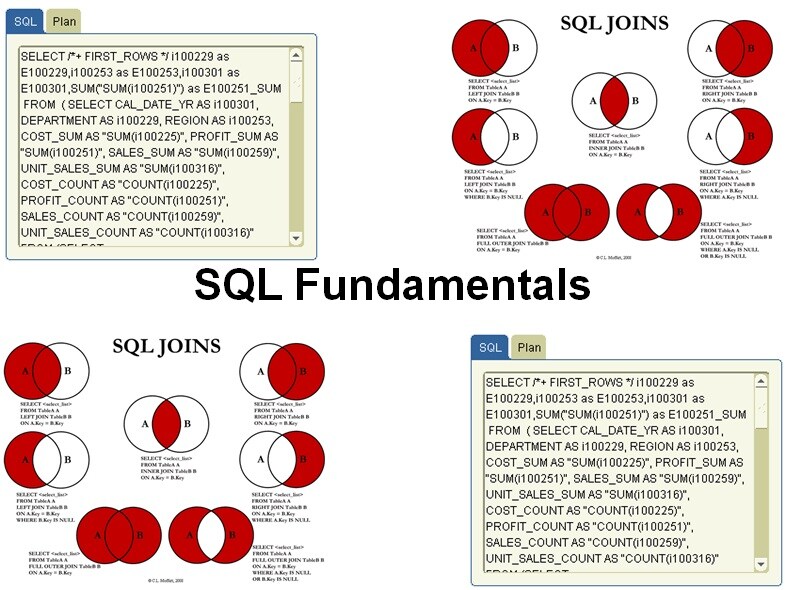-
Learning by doing
-
Trainers with practical experience
-
Classroom training
-
Detailed course material
-
Clear content description
-
Tailormade content possible
-
Training that proceeds
-
Small groups
In the course SQL Fundamentals the widely used and generic query language SQL is discussed. SQL is the abbreviation for Standard Query Language and is an ANSI and ISO standard that can be used in all relational database management systems (DBMS). With SQL you can retrieve data from databases as well as modify data in databases.
The course SQL Fundamentals starts with a treatment of the SQL Standard. The structure of relational databases with tables and their relationships is covered. SQL can be used in many database systems such as Oracle, MySQL, Microsoft Access, Microsoft SQL Server, DB2, Informix, PostgreSQL and more. Almost every DBMS has also added its own extra functions to standard SQL.
Next attention is paid to practical skills to write SELECT queries. This also includes clauses such as WHERE, ORDER BY, GROUP BY, HAVING, LIKE and BETWEEN .. AND.
Then it is time for the different data types used in the SQL language such as numeric, binary and string types. The data types related to dates and time are treated. And the SQL CREATE TABLE statement with which tables are created is discussed as well.
Part of the program of the course is also the treatment of various functions that are part of the SQL Standard. Among others mathematical, conversion and aggregation functions for calculating sum and average are covered.
Adding and adjusting data by means of INSERT and UPDATE statements is discussed next. And transactions that either become final with commit or are rolled back with rollback are treated.
Finally attention is paid to what foreign key relationships between tables are and how JOIN queries can be used to retrieve data from related tables.
The course SQL Fundamentals is aimed at a wide audience of system administrators, end users of Office applications and novice programmers who want to access relational databases efficiently by using queries in Structured Query Language (SQL).
To be able to participate in the course SQL Fundamentals some familiarity with database systems is beneficial for the understanding.
The theory is treated on the basis of presentations. Demos are used to clarify the theory. There is ample opportunity to practice. The course times are from 9.30 to 16.30.
Participants receive an official certificate SQL Fundamentals after successful completion of the course.

Module 1 : SQL Intro |
Module 2 : Select Queries |
Module 3 : SQL Data Definition |
| What is SQL? History of SQL SQL Standard SQL Parts Environment Relational Databases Normalisation Data Types Database Creation DDL Create Table Data Types Language Elements DML Insert Into SQL Errors Select Query |
Query Structure SELECT .. FROM Options SELECT .. FROM SELECT DISTINCT WHERE Clause Comparison Operators Logical AND and OR Aggregate Functions LIKE Condition BETWEEN .. AND Condition IN Condition IS NULL Condition ORDER BY Clause GROUP BY Clause HAVING Clause |
CREATE Statements Schema and Table Creation Data Types Numeric Types Binary Data Types String Data Types Temporal Data Types Integrity Constraints Keys Not Null Foreign Keys Update and Delete Check Constraint ALTER Table DROP Table |
Module 4 : Functions |
Module 5 : Data Manipulation |
Module 6 : Joins |
| Standard Functions Mathematical Functions String Functions Conversion Functions Single Row Functions Case Manipulation Functions Character Manipulation Characters Numeric Functions Date Functions General Functions Multiple Row Functions Aggregate Functions Formatting Numbers |
Insert Statement Update Statement Updating Table Rows Deleting Table Rows Deleting and Foreign Keys Transactions Commit and Rollback Implicit rollbacks Implicit commits Explicit rollbacks Explicit commits Savepoints Subqueries |
What are Joins? ANSI Join Syntax Cross Join Inner Join Table Aliases Natural Join Left Join Right Join Full Join Full Outer Join Left Excluding Join Right Excluding Join Outer Excluding Join |
